| Unfairly Hated Creatures - Exclusive Sequel |
If you've read my first article on cracked.com, you may have gained a newfound respect
for roaches, rats, mosquitoes, wasps or bacteria, but a fair amount of my article was
ultimately scrapped by the editors for various reasons, including two whole entries on why
you should appreciate flies and intestinal worms. Consider this unused "bonus content" a
sort of follow-up article!
for roaches, rats, mosquitoes, wasps or bacteria, but a fair amount of my article was
ultimately scrapped by the editors for various reasons, including two whole entries on why
you should appreciate flies and intestinal worms. Consider this unused "bonus content" a
sort of follow-up article!
While it's certainly true that some pests are cockroaches, saying that "cockroaches are
pests" is a lot like saying "trees are pests" or "frogs are pests." Cockroaches, the order
Blattodea, are a pretty large and diverse group, comprising over 4,000 described
species, and thus far, less than around thirty have ever shown a capacity to flourish in the
average man-made structure. The other 3,970+ crunchy flavors are about as likely to
colonize your cupboards as an invasion of butterflies, grasshoppers or whooping cranes;
it's just not their environment.
pests" is a lot like saying "trees are pests" or "frogs are pests." Cockroaches, the order
Blattodea, are a pretty large and diverse group, comprising over 4,000 described
species, and thus far, less than around thirty have ever shown a capacity to flourish in the
average man-made structure. The other 3,970+ crunchy flavors are about as likely to
colonize your cupboards as an invasion of butterflies, grasshoppers or whooping cranes;
it's just not their environment.
| Written by Jonathan Wojcik |
| A Madagasar Hissing Cockroach giving birth - not a pest species. source |
We all know how common rats are as laboratory test animals, and an ever-growing
number of people keep them as housepets, holding rat shows devoted to the wide array of
adorably named breeds. Highly intelligent, certain rats have been trained to detect
forgotten land mines and others to effectively diagnose victims of tuberculosis. In India,
rats are even objects of worship; at the Karni Mata temple, visitors are considered
blessed to partake of the rodent's leftovers. None of these people are walking around with
weeping sores, so what gives?
In reality, rats don't so much display an affinity for filth as an affinity for whatever food and
shelter is immediately available, and though they can survive off almost any organic matter
if need be, rats given the choice will default to a diet of fresh vegetation and smaller, living
prey animals. Decaying carcasses just aren't an integral part of a rat's diet.
Today, there are roughly 1,000 world-wide cases of bubonic plague reported annually, but
the disease is easily treatable with conventional antibiotics. Rarely lethal, Bubonic is
seldom even contracted from rats in particular. Compare this to the millions of people
treated each year for rabies (a disease that rats are not known to carry at all) with an
estimated 30,000 to 50,000 fatalities.
number of people keep them as housepets, holding rat shows devoted to the wide array of
adorably named breeds. Highly intelligent, certain rats have been trained to detect
forgotten land mines and others to effectively diagnose victims of tuberculosis. In India,
rats are even objects of worship; at the Karni Mata temple, visitors are considered
blessed to partake of the rodent's leftovers. None of these people are walking around with
weeping sores, so what gives?
In reality, rats don't so much display an affinity for filth as an affinity for whatever food and
shelter is immediately available, and though they can survive off almost any organic matter
if need be, rats given the choice will default to a diet of fresh vegetation and smaller, living
prey animals. Decaying carcasses just aren't an integral part of a rat's diet.
Today, there are roughly 1,000 world-wide cases of bubonic plague reported annually, but
the disease is easily treatable with conventional antibiotics. Rarely lethal, Bubonic is
seldom even contracted from rats in particular. Compare this to the millions of people
treated each year for rabies (a disease that rats are not known to carry at all) with an
estimated 30,000 to 50,000 fatalities.
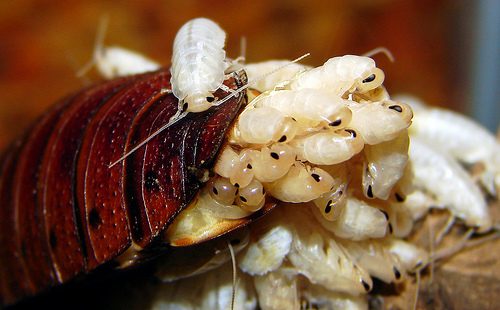
Like cockroaches, much of the mosquito family is no threat to any of us. You may have
heard that only the female mosquito feeds on blood at all, but many species prey
exclusively on ultra-specific host animals and many more are entirely vegetarian. There are
even species who feed only on nectar as adults but cannibalize other mosquitoes as
larvae, making them a semi-effective form of natural pest control.
Even if the nasty little nibbles of some mosquitoes truly make you miserable, perhaps you
should consider what was biting into your ancient ancestors when they stepped outside on
a warm summer night:
heard that only the female mosquito feeds on blood at all, but many species prey
exclusively on ultra-specific host animals and many more are entirely vegetarian. There are
even species who feed only on nectar as adults but cannibalize other mosquitoes as
larvae, making them a semi-effective form of natural pest control.
Even if the nasty little nibbles of some mosquitoes truly make you miserable, perhaps you
should consider what was biting into your ancient ancestors when they stepped outside on
a warm summer night:
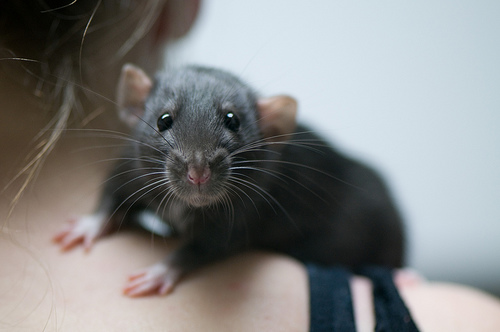
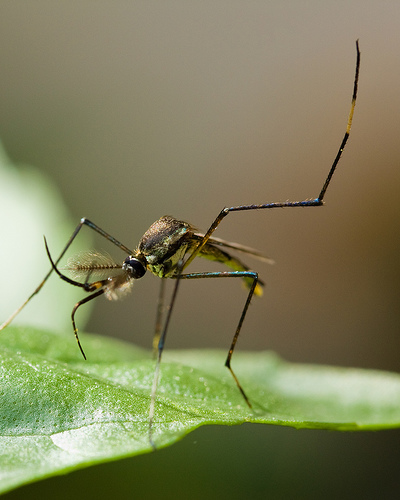
| The gentle, helpful Elephant Mosquito. Source |
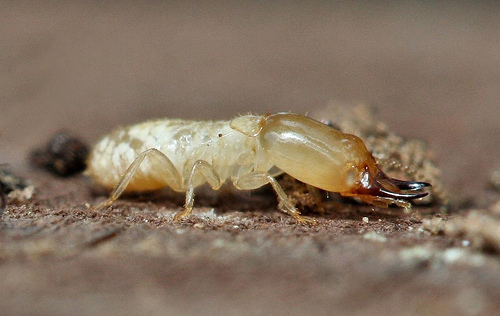
In addition to their functions as decomposers, pollinators and beneficial predators,
cockroaches are also integral to the health of the world's forests. Many varieties of
wood-eating roach process fallen trees into fertilizer for fresh growth, including the
strangest cockroaches of all, the termites. Roaches and termites are to trees as maggots
are to meat, unmatched in their ability to clear away dead wood before it becomes a
hazard. When these ancient creatures go to town on your new deck, nature is just trying to
clean up another mess.
cockroaches are also integral to the health of the world's forests. Many varieties of
wood-eating roach process fallen trees into fertilizer for fresh growth, including the
strangest cockroaches of all, the termites. Roaches and termites are to trees as maggots
are to meat, unmatched in their ability to clear away dead wood before it becomes a
hazard. When these ancient creatures go to town on your new deck, nature is just trying to
clean up another mess.
| A soldier termite. source |
| Cockroaches |
| Mosquitoes |

Everything in nature is supposed to have a predator that keeps it in check, but we humans
outlived (or personally eradicated) countless saber-toothed monsters and terror birds who
naturally preyed upon us. Now, we turn around and complain about losing a little blood to
teency-weency itchy flies. We devastate whole ecosystems trying to poison them to death.
Yes, biting mosquitoes do cause more human deaths than any other animal alive today,
but drunk driving, cigarettes, bad eating habits, gun violence and unstoppable weather
forces kill more people than that and our population still keeps growing. Mosquitoes are
one of nature's last living defenses against us, and it isn't even working to keep our
numbers consistent. Are you still going to whine about them? Really?
outlived (or personally eradicated) countless saber-toothed monsters and terror birds who
naturally preyed upon us. Now, we turn around and complain about losing a little blood to
teency-weency itchy flies. We devastate whole ecosystems trying to poison them to death.
Yes, biting mosquitoes do cause more human deaths than any other animal alive today,
but drunk driving, cigarettes, bad eating habits, gun violence and unstoppable weather
forces kill more people than that and our population still keeps growing. Mosquitoes are
one of nature's last living defenses against us, and it isn't even working to keep our
numbers consistent. Are you still going to whine about them? Really?
| It was good a day when a neanderthal only got Malaria. |
| Rats |
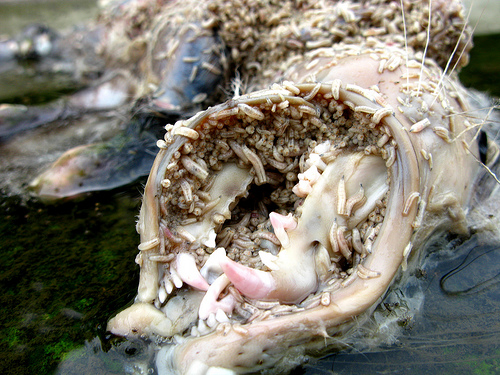
If it's dead and it stinks, it's going to attract flies, and if it attracts flies, they're going to
vomit all over it and have sex on it. In only days, the rotting refuse can come alive with the
writhing, seething bodies of thousands, even millions of ravenous baby maggots, almost
universally considered one of the most repugnant visuals in nature.
vomit all over it and have sex on it. In only days, the rotting refuse can come alive with the
writhing, seething bodies of thousands, even millions of ravenous baby maggots, almost
universally considered one of the most repugnant visuals in nature.
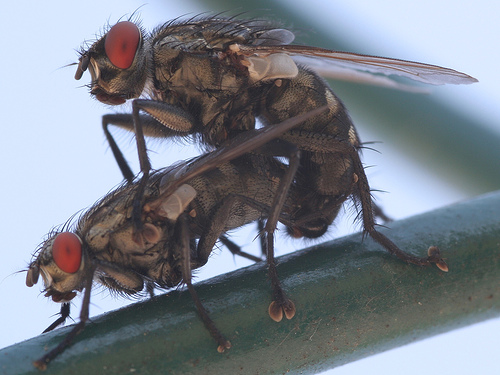
Even your deeply-buried granny isn't safe, as the aptly-named coffin flies have no trouble
sniffing out her decomposing hide and worming their way into her $7,000 casket. It's no
myth that adult houseflies positively swim with potentially infectious microorganisms, and
some species don't even wait for us to die before gorging on our blood or planting eggs in
our flesh. In ancient Rome, maggots were believed to grow spontaneously from rancid
flesh, and in Western religion, flies have been associated with the forces of hell.
sniffing out her decomposing hide and worming their way into her $7,000 casket. It's no
myth that adult houseflies positively swim with potentially infectious microorganisms, and
some species don't even wait for us to die before gorging on our blood or planting eggs in
our flesh. In ancient Rome, maggots were believed to grow spontaneously from rancid
flesh, and in Western religion, flies have been associated with the forces of hell.
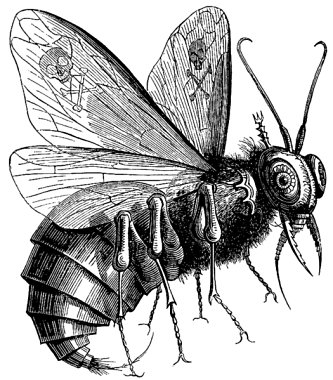
Flies, however, are a family with some of the most extreme variation in the insect world,
surpassed only by the beetles in distribution, diversity and musical talent. Some are
scavengers, some are parasites, some lay their eggs in seawater and some can be found
in the frozen tundra. Some are even ironically flightless. Most species, however, are
nectar drinkers, and play a greater role in pollination (allowing flowering plants to
reproduce at all) than even the esteemed bees and butterflies. We even have flies to thank
for chocolate; the flowers of the cocoa tree are perfectly sized, shaped and scented to be
pollinated by tiny fungus-gnats. Other flies are major predators of more destructive
insects, such as one species that decapitates fire ants.
surpassed only by the beetles in distribution, diversity and musical talent. Some are
scavengers, some are parasites, some lay their eggs in seawater and some can be found
in the frozen tundra. Some are even ironically flightless. Most species, however, are
nectar drinkers, and play a greater role in pollination (allowing flowering plants to
reproduce at all) than even the esteemed bees and butterflies. We even have flies to thank
for chocolate; the flowers of the cocoa tree are perfectly sized, shaped and scented to be
pollinated by tiny fungus-gnats. Other flies are major predators of more destructive
insects, such as one species that decapitates fire ants.
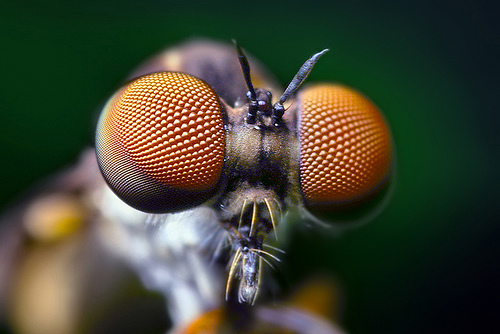
Even some of our least favorite flies play a big role in keeping our planet hospitable; think
for a moment how easily they get into your foulest garbage at the first opportunity, and think
about how many other creatures are making nasty messes every second of every day
wherever life resides.
While birds, beetles, ants and woodland critters of all sorts will take to gnawing on a
carcass, it's maggots that are chowing down on more than half the world's land-animal
waste at any given time, and it's maggots that will pick the last tiny scrap from each
glistening bone. That acid they spit up is even a natural antiseptic, possibly hindering all
manner of nasty pox that builds up in the dead.
Those of us who prefer only recently deceased flesh find this all a might ghastly, but it's
hard to overestimate just how much filthier, funkier and sicklier our world might be if
nature's buzzing housekeepers spontaneously vanished. It's a dirty cliché, but somebody's
gotta do it.
for a moment how easily they get into your foulest garbage at the first opportunity, and think
about how many other creatures are making nasty messes every second of every day
wherever life resides.
While birds, beetles, ants and woodland critters of all sorts will take to gnawing on a
carcass, it's maggots that are chowing down on more than half the world's land-animal
waste at any given time, and it's maggots that will pick the last tiny scrap from each
glistening bone. That acid they spit up is even a natural antiseptic, possibly hindering all
manner of nasty pox that builds up in the dead.
Those of us who prefer only recently deceased flesh find this all a might ghastly, but it's
hard to overestimate just how much filthier, funkier and sicklier our world might be if
nature's buzzing housekeepers spontaneously vanished. It's a dirty cliché, but somebody's
gotta do it.
| Flies |
| Parasites |
Alright, so we've established that such widely despised animals as the cockroach and the
maggot are useful or at least inconsequential to society, but if there's one thing in nature
the entire free world has unrelenting disdain for, it's parasites. The very word is hurled as
an insult for one who fails to justify their own existence, and even science once considered
parasites the very antithesis of evolutionary progress; a degenerate shortcut for species
that couldn't cut it outside of a lizard's anus.
While the timber wolf peeling gory chunks from the bones of a buffalo is an embodiment of
all nature's raw, poetic majesty, we can only look down our noses at the spineless,
brainless fluke that so quietly and painlessly hangs off its pancreas.
maggot are useful or at least inconsequential to society, but if there's one thing in nature
the entire free world has unrelenting disdain for, it's parasites. The very word is hurled as
an insult for one who fails to justify their own existence, and even science once considered
parasites the very antithesis of evolutionary progress; a degenerate shortcut for species
that couldn't cut it outside of a lizard's anus.
While the timber wolf peeling gory chunks from the bones of a buffalo is an embodiment of
all nature's raw, poetic majesty, we can only look down our noses at the spineless,
brainless fluke that so quietly and painlessly hangs off its pancreas.
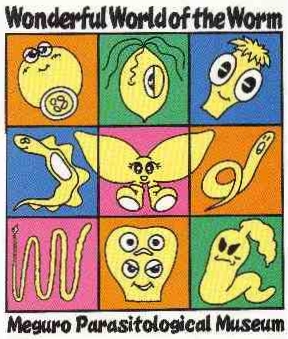
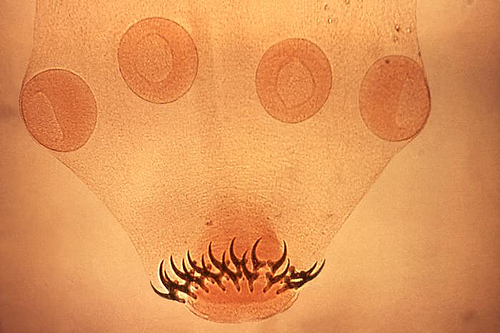
Strip away our abstract, objective romanticism for a moment, and that slimy little worm is
actually living the more demanding, more sophisticated lifestyle, wielding an arsenal of
biochemical trickery to cloak itself against the wolf's immune system, resist enzymes
capable of breaking down metal, compete with dozens of other parasites and eventually
pass its offspring to an entirely different animal.
Every non-parasitic species on the planet is believed to host at least one unique species
of parasite, and while some varieties do cause nightmarish agony and death, the vast
majority have evolved to cause as little discomfort as possible, and their hosts evolved
with their presence in mind all along; recent studies seem to link the prevalence of asthma
and other immune disorders to our self-imposed hookworm deficiency, one lead
parasitologist claims to have cured himself of allergies by giving himself tapeworm, and
one university is researching whip-worm as a treatment for bowel disease. These
creatures freely wriggled through our ancestor's entrails for tens of millions of years, so it
shouldn't be surprising that our bodies aren't really accustomed to an uninhabited colon.
actually living the more demanding, more sophisticated lifestyle, wielding an arsenal of
biochemical trickery to cloak itself against the wolf's immune system, resist enzymes
capable of breaking down metal, compete with dozens of other parasites and eventually
pass its offspring to an entirely different animal.
Every non-parasitic species on the planet is believed to host at least one unique species
of parasite, and while some varieties do cause nightmarish agony and death, the vast
majority have evolved to cause as little discomfort as possible, and their hosts evolved
with their presence in mind all along; recent studies seem to link the prevalence of asthma
and other immune disorders to our self-imposed hookworm deficiency, one lead
parasitologist claims to have cured himself of allergies by giving himself tapeworm, and
one university is researching whip-worm as a treatment for bowel disease. These
creatures freely wriggled through our ancestor's entrails for tens of millions of years, so it
shouldn't be surprising that our bodies aren't really accustomed to an uninhabited colon.
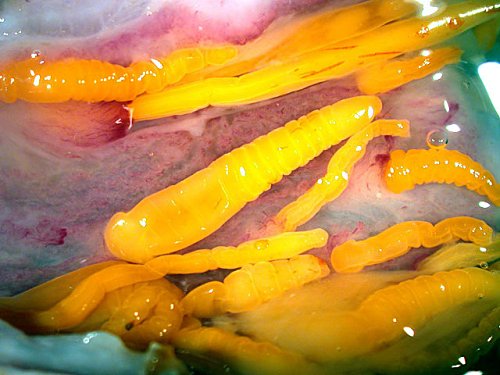
| A healthy body is a happy body. |
Parasites are now thought to be one of the most widely influential forces in the entire
natural order. Predation may be what prevents a species from overcrowding and
destroying itself, but it's the parasites who make predation happen, effectively feeding
animals to other animals to such an extent that to purge them from an ecosystem would be
to plunge it into chaos. Without their subtle influence, many species would breed out of
control while others dwindled to extinction, and you could throw natural selection right out
the window.
Some have even proposed that parasites may have had a major hand (or sucker) in the
very evolution of sex, so it's entirely possible that we wouldn't enjoy porn if our ancestors
weren't crawling with pinworm. Sure, this all still boils down to our bodies attempting to
resist them, but think of it as a form of tough love; in the evolutionary arms race, parasitic
worms are a lot like the High School bully whose harmless but infuriating assaults were an
encouragement to do something better with your life. We may find them alien and even
disturbing, but in the end, it's parasites that oil the nature machine's hinges. Possibly with
mucus.
natural order. Predation may be what prevents a species from overcrowding and
destroying itself, but it's the parasites who make predation happen, effectively feeding
animals to other animals to such an extent that to purge them from an ecosystem would be
to plunge it into chaos. Without their subtle influence, many species would breed out of
control while others dwindled to extinction, and you could throw natural selection right out
the window.
Some have even proposed that parasites may have had a major hand (or sucker) in the
very evolution of sex, so it's entirely possible that we wouldn't enjoy porn if our ancestors
weren't crawling with pinworm. Sure, this all still boils down to our bodies attempting to
resist them, but think of it as a form of tough love; in the evolutionary arms race, parasitic
worms are a lot like the High School bully whose harmless but infuriating assaults were an
encouragement to do something better with your life. We may find them alien and even
disturbing, but in the end, it's parasites that oil the nature machine's hinges. Possibly with
mucus.